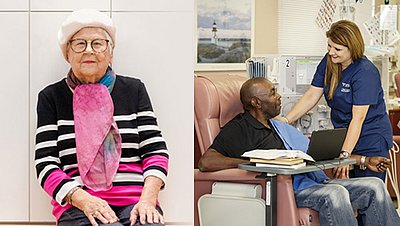Fresenius Medical Care In-Center dialysis products, therapies and services for Healthcare Professionals.
Diary of a dialysis patient
September 21
Today, I feel totally wiped-out. And tomorrow, I’ve got another treatment. I’m beginning to worry: How can I work when I have treatment one day and feel bad the next? Will this get any better? Why has God chosen this for me?
October 5
Because dialysis and blood cleansing are only one part of treatment for my impaired kidneys, I have to change my diet. That means less fluid intake, only a little salt, and food that is low in potassium and phosphorus. There are so many things to think of. Janie is a great cook, but this transition has made me lose all my appetite. I have been transferred out of the hospital to a dialysis center. From now on, I’ll go to centers like this.
October 19
I met my case manager. Her name is Sheryl Fletcher and she has been a nurse for 25 years. She realized that I object to the dialysis machine, and she told me: “Buddy, this machine is keeping you alive!” She also informed me about other treatment options, for example home hemodialysis, peritoneal dialysis or a kidney transplant.
November 19
My wife tells me: “I think you are depressed!”, which I deny. But she insists on it. I do admit I have a lot in my head at the moment. But when you’re on dialysis three times a week for several hours, you have a lot of time to brood over things. Oh, time! How do we use our time while we are alive? How do we use other people’s time? Is my life of lesser value now that I’m not as productive as I used to be?
December 7
I am getting used to my ‘learning materials’ – or rather to Sheryl Fletcher’s format of presenting them to me. I can discuss my work obligations and my need to travel with her. Sometimes I reflect on the time spent with her and can say, that was a good session. Overall, I am starting to feel better.
December 16
I have come to accept that the dialysis machine is not a noisy necessity, but my lifeline. I am also happy about my conversations with Sheryl Fletcher. She does a great job of not only testing me on specific material, but also letting me talk about how I feel concerning my situation. I certainly thank her for her patience! And I have found friends among the other patients. It’s a gift not to be alone in this situation.
December 25
No dialysis today, but Christmas celebrations with my community. I have made the decision to slow down. My family is a source of stability to me. I thank the Lord for all of that.





